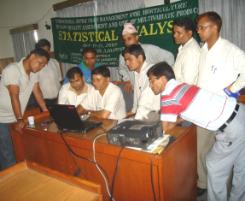Uni involved in Nepal's horticulture training event
Published on 06 September, 2007
CQU's Centre for Plant and Water Science (CPWS) has worked alongside a range of stakeholders to organise a 5-day training workshop on International Supply Chains for Horticultural Produce; with a focus on Quality Assessment and the use of Multivariate Statistical Analysis.
The training was scheduled from July 17 to 21 at the Nepal Agriculture Research Council (NARC) training complex in Khumaltar.

Phul Subedi (in front of laptop) explaining use of chemometric software
The University's collaborators included the Horticulture Research Division (HRD) and the NARC.
This program was partially supported by the ATSE Crawford Fund Australia and Camo Software India.
The broad objectives of the training workshop were:
- to deepen understanding of ‘produce quality', particularly with reference to horticultural produce, to develop practical skills in assessing such attributes, and to understand the theory of advanced technologies being developed for assessment of such attributes;
- to develop an understanding of the dominant supply chains for international marketing of horticultural produce, and their required specifications/quality control, including overview of quality control structures such as the Codex Alimentarus, EureGap and USID product specification guidelines.
The training was focused on:
- supply chain management of perishable commodities with particular focus on fruits and vegetables; training was also included with some successful stories of Australian horticulture industries in mango, citrus and grapes, and the consequent changes to production practice, transport (cool chain) and marketing.
- examples of quality control/regulatory systems in use for fresh fruit, eg Australia and New Zealand product-specification guidelines, EureGap, USDA supply chain standard and product supply chain in Thailand.
- a rapid marketing appraisal survey was designed to understand the present marketing system, government regulations and policy frame for marketing fresh fruit and vegetables in Kathmandu, the capital city.
- the standard quality control assessment procedures.
- advanced, non-invasive quality control procedures: e.g., NIRS, NMR, acoustic, X-ray.
- topics in sampling technique and sample preparation,
- use of chemo-metric techniques using multivariate analysis, for example using the Unscrambler packager.
- introduction to a specific (multivariate) statistical analysis tool, for use in R&D programs.
CQU's training coordinator and presenter Phul Subedi delivered and highlighted the importance of the training in the context that Nepal has just started as a member country in WTO.
A total of 14 young scientists working in Agriculture Research Stations (horticulture) from all over the country participated.
Mr Subedi also organized a number of meetings with representatives of the Ministry of Agriculture (MOA), the Nepal Federation Chamber if Commerce and Industries (FNCCI), the Nepal Agricultural Research and Development Fund (NARDF) and senior management of NARC and IAAS (Institute of Agriculture and Animal Science).
He also presented 2 seminars, in NARC headquarters and at the IAAS Dean's office, Rampur, Chitwan.

